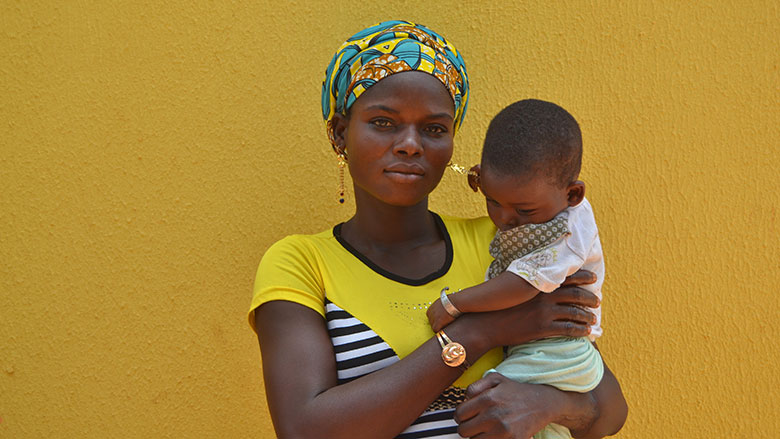MANGA, Burkina Faso, March 8, 2021—Snack time has just ended. Sporting a fine white moustache, several children linger at the table, savoring the last drops of milk in their cups and carefully gathering up the remaining breadcrumbs with their chubby fingers. But most of the kids have already run off to play in the shade of the big acacia tree in the courtyard.Squealing and giggling, some of them spin on the roundabout, while others play catch with a ball or balance like acrobats on tires that have been set into the ground. A small group of girls is having a tea party. The shyest ones are leafing through a book or discovering the joy of mixing bright paint colors on a sheet of paper. A little further on, older children sitting crisscross-applesauce are clapping their hands to the new counting rhyme that a daycare assistant is teaching them while the youngest ones nap.
It’s a typical scene from a daycare center, with one little difference: This is a revolutionary change for Manga, a town of 28,000 that is a two-hour drive from Ouagadougou. “Knowing that our children are in a safe place gives us peace of mind while we work and reassures our husbands,” explains Minata Dianda, a young mother whose child is in the daycare center.

Earning enough money to support their children while taking care of them is a challenge for many women
It all began in 2016 when the government decided to launch a temporary job program in the poorest communes of the country as a way of fighting youth unemployment. This is a widespread problem that fuels social tensions in Burkina Faso, one of the world’s poorest countries. 40% of the population lives below the poverty line (US$1.90 a day per person) and escalating conflicts have created an unprecedented humanitarian crisis since 2016.
The aim of the project: offering basic skills training to young people and providing them with a job for six months in public urban development and roadbuilding projects. A lottery system was set up for the selection of candidates. Cleaning out gutters, weeding, tree pruning… the work is varied and very physically demanding.
Even so, more women applied and were, in fact, selected. The problem was that many of them hadn’t dared to say that they were pregnant or had small children in need of childcare because that would have automatically disqualified them.
“It became clear that the women were hiding their children and were making do in whatever way they could to take care of them,” explains Savadogo Ouédraogo, mayor of the third arrondissement of Manga. These makeshift arrangements were far from ideal. Older sisters were often called on to watch over their little siblings, forgoing their own childhood and schooling. “Otherwise, they would be left with a grandmother or a friend, often sitting for hours out in the glaring sun near building sites so that their mothers could come to nurse them and take care of them on their breaks.” These kinds of situations were dangerous for the children and stressful for their mothers.

This gave the program organizers an idea: “In Burkina Faso, working-age women may have between 5 and 7 children,” says Rebekka Grun, an expert on social issues with the World Bank, which has provided $50 million in funding for the youth employment project through its International Development Association. “”
Since “It takes a village to raise a child,” the project team decided to set up a focus group to look for a way to resolve this problem. They contacted relevant ministries such as education, social affairs and women’s affairs. They also recruited a childhood development expert and sought assistance from partner organizations in order to work more effectively. Most importantly, they invited mothers who were employed on the worksites to tell the team members about their difficulties and needs. That’s when the group came up with the idea of creating mobile childcare units that would address the needs of these temporary workers, who had to move from one worksite to another. A pilot project was then launched in Manga and two other communes.




